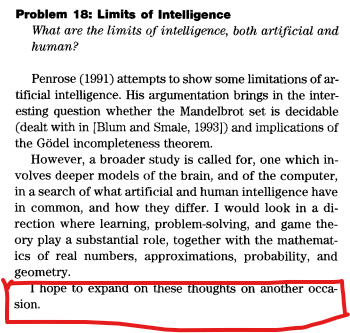This snippet is from Smale's paper Smale, Steve (1999). "Mathematical problems for the next century". In Arnold, V. I.; Atiyah, M.; Lax, P.; Mazur, B. (eds.). Mathematics: frontiers and perspectives. American Mathematical Society. pp. 271–294. ISBN 978-0821820704.
Problem 18: Limits of Intelligence
What are the limits of intelligence, both artificial and human?
Penrose (1991) attempts to show some limitations of artificial intelligence. His argumentation brings in the interesting question of whether the Mandelbrot set is decidable (dealt with in [Blum and Smale, 1993]) and implications of the Gödel incompleteness theorem.
However, a broader study is called for, one which involves deeper models of the brain and of the computer, in a search of what artificial and human intelligence have in common, and how they differ. I would look in a direction where learning, problem-solving, and game theory play a substantial role, together with the mathematics of real numbers, approximations, probability, and geometry.
I hope to expand on these thoughts on another occasion.
Did he follow up on these thoughts (hopefully) in a mathematical way? Since his list of $18$ problems is intended to be in mathematics, I was hoping this last question on his list has a mathematical exposition!

